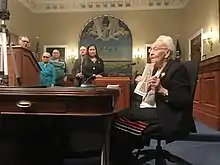Marcella LeBeau
Marcella Ryan LeBeau (born October 12, 1919)[1] (also known as Marcella Le Beau and Wignuke Waste’ Win) is a Lakota elder, politician, nurse, and military veteran.
Early life and education
Marcella LeBeau was born Wignuke Waste’ Win (English: Pretty Rainbow Woman) in 1919 in Promise, South Dakota on the Cheyenne River Indian Reservation.[1][2] Her parents were Joseph M. Ryan and Florence Four Bear Ryan. Her mother was of the Two Kettles subtribe of the Lakota. Her father was Irish-American. She was the oldest of five children in the family. Her mother died when she was ten and LeBeau was raised by her father. LeBeau also helped run the household, learning to cook and sew to care for her siblings.[3] As a child, she attended an Indian boarding school.[1]
She earned her undergraduate degree in nursing in 1942 from St. Mary's Hospital in Pierre, South Dakota.[4]
Career and life
After graduation, LeBeau began working as a registered nurse in Pontiac, Michigan.[2] In 1943,[2] she enlisted in the United States Army Nurse Corps to serve in World War II.[4] LeBeau served in France, England and Belgium under the 76th General Hospital unit, including at the Battle of the Bulge. She left the Army as a First Lieutenant.[2]
When her service ended, she returned to South Dakota, specifically Rapid City. While there, she experienced racial segregation, such as not being allowed to purchase certain products, such as vanilla extract, at the grocery store.[1]
LeBeau worked for the Indian Health Service (IHS). LeBeau served as director of nursing at the IHS facility in Eagle Butte, South Dakota. She worked for IHS for 31 years before retiring.[4] As a result of her medical career, she received the O. Marie Henry RNDNSC Chief Nurse and the Mable Ann Wagner Award.[3]
In 1991, she was elected to the Cheyenne River Sioux Tribal Council. During her tenure on the council, LeBeau banned smoking in tribal chambers and promote other anti-smoking policies. LeBeau's anti-smoking efforts on the Cheyenne River Indian Reservation is credited with helping the reservation become the first smoke-free community in South Dakota.[4]
Current life
In 2004, LeBeau was awarded the Legion of Honour for her World War II service.[4] LeBeau was inducted into the South Dakota Hall of Fame in 2006.[3]

LeBeau was awarded the Women in History Award from the Spirit of the Prairie Chapter of the Daughters of the American Revolution in 2016.[4] LeBeau also has an honorary degree from South Dakota State University.[1][4] She celebrated her 100th birthday on October 12, 2019. That day was proclaimed Wigmuke Waste Win (Pretty Rainbow Woman) Marcella LeBeau Day by the state of South Dakota.[1] She also received a Senatorial Tribute by Senator John Thune and a quilt from the North American Indian Women's Association, an organization which she helped found.[1][3]
LeBeau supports the Remove the Stain Act in the United States Congress, which seeks to rescind the medals of honor awarded to American soldiers who participated in the Wounded Knee Massacre.[5] In 2019, she spoke at a ceremony to introduce the bill, alongside Deb Haaland, at the U.S. Capitol.
In 2020, LeBeau was awarded a Leadership Award from the National Congress of American Indians.[5]
Personal life
LeBeau was married and has eight children.[3]
References
- Rust, Jody (16 October 2019). "100 Years Young: Marcella LeBeau joined by family and friends near and far for celebration". West River Eagle. Retrieved 28 December 2020.
- "Marcella Ryan Le Beau collection: Veterans History Project (Library of Congress". memory.loc.gov.
- "Marcella LeBeau - SD Hall of Fame Programs". South Dakota Hall of Fame. Retrieved 28 December 2020.
- "Marcella LeBeau". South Dakota State University. Retrieved 28 December 2020.
- Rickert, Levi (12 February 2020). "100-Year-Old Lakota Marcella Lebeau Among Recipients of NCAI Leadership Awards". Native News Online. Retrieved 28 December 2020.
External links
- "Vulnerable Native Americans need protection from COVID-19" op-ed by Marcella Lebeau in Indianz in 2020